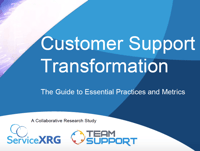ServiceXRG and TeamSupport have joined forces to create a comprehensive study of the Support industry that is now available for download. The 2021 Customer Support Transformation report examines current trends in Support delivery and offers tangible guidance for Support and Service professionals to meet growing expectations of both customers and company executives.
This three-part blog series aims to break down the main principles of the report into three parts to more clearly highlight the report’s key points.
Part 1: The Transition of Support from a Reactive Transactional Model to a More Proactive and Preventive Approach
As we enter 2021 the strategic role of B2B Support must be aligned (or realigned) with overall corporate strategies. Companies that are moving to subscription-based relationships with customers and seeking to bolster recurring revenue streams must leverage Support as an integral part of their post-sales strategies to sustain and expand customer relationships and drive recurring revenues.
Support continues to be the preeminent technical resource for resolving customer issues and advocating for product usability and performance enhancements. Company-wide initiatives to improve customer experiences (CX) and drive success are influencing Support to engage in new, more meaningful customer interactions.
While most companies have Customer Success initiatives, many rely on Support’s expertise and resources to contribute to the attainment of customer outcomes. Support organizations must prepare to scale to meet growing demand as they are increasingly called upon to participate in success-related activities.
The Subscription Effect
Nearly a third (30% to be exact) of technology companies have come to market with, or moved exclusively to, a subscription licensing model. Most other companies offer both perpetual and subscription licensing options with nearly all indicating an intent to continue their shift to subscription.
The shift to subscription fundamentally changes the financial relationship with customers from pay-upfront to own products, to a pay-as-you-go to use products.
For revenue to continue to flow, customers must continue to use products. It is not sufficient to only satisfy customers, Support must help deliver positive customer experiences that help sustain existing relationships.
Key Imperatives for Support
1. Support must invest in efforts to scale capabilities by reducing demand and operating more efficiently; ticket automation, leveraging AI, and a knowledge base of self-help tools will go a long way towards both. The consequence of not doing so is that demand will outpace staffing and resources.
2. Support will increasingly be influenced by and involved with success-related efforts to drive customer adoption, success, and retention.
3. Make efforts to capture and learn from customer interactions an imperative to driving Support efficiency.
4. Expand efforts to build customer proficiency through training, coaching and skills development.
Overall support demand grew by 10.6% in 2020. The largest drivers are new customers, higher user adoption of product features, and more proactive outreach by Support. In Part 2 of our highlights from the Customer Support Transformation report, we explore why proactive support is on the rise and how it helps reduce churn and drive recurring revenues.

|
Since 2004, ServiceXRG has guided the world’s leading technology companies in their strategic efforts to retain customers, grow recurring revenue, and achieve cost efficiencies through the delivery of high-quality Technical Support and Customer Success services. Download the full report, Customer Support Transformation: The Guide to Essential Practices and Metrics. |
Looking For Startup Consultants ?
Call Pursho @ 0731-6725516
Telegram Group One Must Follow :
For Startups: https://t.me/daily_business_reads







